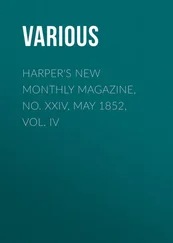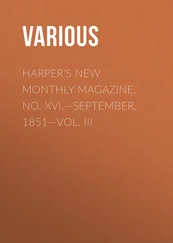Various - Harper's New Monthly Magazine, No. VII, December 1850, Vol. II
Здесь есть возможность читать онлайн «Various - Harper's New Monthly Magazine, No. VII, December 1850, Vol. II» — ознакомительный отрывок электронной книги совершенно бесплатно, а после прочтения отрывка купить полную версию. В некоторых случаях можно слушать аудио, скачать через торрент в формате fb2 и присутствует краткое содержание. Издательство: Иностранный паблик, Жанр: periodic, foreign_edu, на английском языке. Описание произведения, (предисловие) а так же отзывы посетителей доступны на портале библиотеки ЛибКат.
- Название:Harper's New Monthly Magazine, No. VII, December 1850, Vol. II
- Автор:
- Издательство:Иностранный паблик
- Жанр:
- Год:неизвестен
- ISBN:нет данных
- Рейтинг книги:4 / 5. Голосов: 1
-
Избранное:Добавить в избранное
- Отзывы:
-
Ваша оценка:
- 80
- 1
- 2
- 3
- 4
- 5
Harper's New Monthly Magazine, No. VII, December 1850, Vol. II: краткое содержание, описание и аннотация
Предлагаем к чтению аннотацию, описание, краткое содержание или предисловие (зависит от того, что написал сам автор книги «Harper's New Monthly Magazine, No. VII, December 1850, Vol. II»). Если вы не нашли необходимую информацию о книге — напишите в комментариях, мы постараемся отыскать её.
Harper's New Monthly Magazine, No. VII, December 1850, Vol. II — читать онлайн ознакомительный отрывок
Ниже представлен текст книги, разбитый по страницам. Система сохранения места последней прочитанной страницы, позволяет с удобством читать онлайн бесплатно книгу «Harper's New Monthly Magazine, No. VII, December 1850, Vol. II», без необходимости каждый раз заново искать на чём Вы остановились. Поставьте закладку, и сможете в любой момент перейти на страницу, на которой закончили чтение.
Интервал:
Закладка:
"The dimensions of this mercy are above my thoughts – it is, for aught I know, a crowning mercy. I am bold humbly to beg that the fatness of these continued mercies may not occasion pride and wantonness, as formerly the like hath done to a chosen people."
If Cromwell had understood the true meaning of the Saviour's words, "I will have mercy, and not sacrifice," he would probably have acted more like a Christian and written less like a Jew.
"But to return," saith the quaint chronicler of Boscobel, "to the duty of my attendance on his majesty in Spring Coppice. By that time Richard Penderel had conveyed him to the obscurest part of it, it was about sun-rising on Thursday morning, and the heavens wept bitterly at these calamities, insomuch that the thickest tree in the wood was not able to keep his majesty dry, nor was there any thing for him to sit on; wherefore Richard went to Francis Yates's house, a trusty neighbor, who had married his wife's sister, where he borrowed a blanket, which he folded and laid on the ground for his majesty to sit on." A three-legged stool would have been a luxury, at that comfortless period, to the throneless monarch, who claimed three realms as his rightful inheritance.
Richard Penderel, when he borrowed the blanket of his sister-in-law, the good-wife Yates, considerately begged her to provide a comfortable breakfast and bring it to him, at a place which he appointed in the wood. She presently made ready a mess of milk, and brought it, with bread, butter, and eggs, to the cold, wet, and half-famished king. Charles was, at first, a little startled at her appearance, but, perceiving she came on a kindly errand, he frankly appealed to her feminine compassion in these words:
"Good woman, can you be faithful to a distressed cavalier?"
"Yes, sir," she replied; "I will die rather than discover you!"
The king, well satisfied with the honest plainness of her answer, was able to eat with a hearty relish the simple fare she had brought him. In the course of that day, he made up his mind to leave his woodland retreat, and endeavor to get into Wales. Richard Penderel, having consented to attend him in the capacity of a guide, conducted him first to his own house, Hobbal Grange, "where the old good-wife Penderel had not only the honor to see his majesty," pursues our authority, "but to see him attended by her son." A greater honor far, it was for her to feel that she was the mother of five sons, whom all the wealth of England would not have bribed, nor all the terrors of a death of torture intimidated, to betray their fugitive sovereign to those who thirsted for his blood. Cornelia, the mother of the Gracchi, had less reason to feel proud of her filial jewels, than this rustic English matron of her brave Shropshire lads. She had lost a sixth son, who had been slain fighting in the cause of King Charles I. Hobbal Grange was the paternal farm where these six brethren, William, John, Richard, Humphrey, Thomas, and George, were born. Thomas, George, and John, had all enlisted in the service of the late king, and fought for him as long as he had an army in the field; William was the house steward at Boscobel; Humphrey was the miller at Whiteladies; and Richard rented a part of his mother's farm and house, Hobbal Grange; he also pursued the business of a woodman. At Hobbal Grange, the king's disguise was completed, and he was furnished with a woodman's bill, to enable him the better to act the part of Richard Penderel's man, and it was agreed that he should assume the name of Will Jones. When all these arrangements had been made, and his homely supper ended, his majesty set out at nine o'clock, with intent to walk that night to Madely, in Shropshire, about five miles from Whiteladies, within a mile of the river Severn, which he would have to cross, in order to get into Wales.
Charles found his clouted shoes so uneasy to his feet on this pedestrian journey, that more than once he was fain to walk without, as less painful. About two miles from Madely, in passing Evelin Mill, the king and his trusty guide got an alarm; for Richard unwittingly permitting the gate to clap, the miller came out and challenged them, by asking, gruffly, "Who was there?" Richard, to avoid him, hastily drew the king out of the usual track, and led him through a brook, which they were compelled to ford, and the king's shoes getting full of water increased the uneasiness of his galled and blistered feet. His majesty was afterward wont, in recounting this adventure, to say, that "here he was in great danger of losing his guide, but the rustling of Richard's calf-skin breeches was the best direction he had to follow him in that dark night."
Charles was unconscious at the time how near he was to a party of his own friends, who had just taken refuge in Evelin Mill, and that the honest miller who had caused him so much alarm and distress by his challenge, was only doing his duty by the fugitive cavaliers in keeping guard to prevent a surprise from skulking foes or spies.
His majesty arrived at Madely about midnight, in weary plight; Richard conducted his royal master to the house of a loyal gentleman there, of the name of Woolf, on whose integrity he knew he could rely. The family had retired to rest, but Richard took the liberty of knocking till Mr. Woolf's daughter came to the door and inquired, "Who that late comer was?" he replied, "The king." An announcement that would, doubtless, have put any young lady into a flutter at a period less disastrous to royalty but such was the tragic romance of the epoch, that persons of all classes were familiarized to the most startling events and changes; the only source of surprise to honest gentlefolks was, the circumstance of finding their heads safe on their own shoulders in the midst of the horrors of military executions, which nearly decimated that neighborhood. Miss Woolf neither questioned the fact, nor hesitated to imperil herself and family by receiving the proscribed fugitive within her doors. She knew the integrity of Richard Penderel, and appreciated the tribute he paid to her courage and her truth, by confiding such a trust to her. The king refreshed and reposed himself beneath this hospitable roof for awhile, but as the rebels kept guard upon the passage of the Severn, and it was apprehended that a party of them, who were expected to pass through the town, might quarter themselves, which frequently happened, in that house, it was judged safer for the royal stranger to sleep in the adjacent barn. His majesty accordingly retired thither, attended by his trusty guide and life-guardsman, Richard Penderel, and remained concealed in that humble shelter the whole of the next day.
The intelligence which Mr. Woolf procured, meantime, was such as to convince him that it would be too hazardous for the king to attempt to prosecute his journey into Wales, and that the best thing he could do would be to return to Boscobel House, as affording facilities for his concealment till a safer opening for his retreat could be found. The king being of the same opinion, it was resolved that he should retrace his steps the next night, and meantime, his hands not being considered sufficiently embrowned for the character he personated, Mrs. Woolf brought some walnut-leaves and stained them. At eleven o'clock, he and the faithful Richard Penderel resumed their march, but midway between Madely and Boscobel, Charles was so completely overcome with grief, fatigue, and the pain he endured from his blistered feet, in his attempts to walk in the stiff shoes, that at last he flung himself on the ground, "declaring life was not worth the struggle of preserving, and that he would rather die than endure the misery he suffered." Richard gave him such comfort as his kindly nature suggested, and bidding him be of good cheer, and wait God's time for better fortunes, at last persuaded him to make a successful effort to reach Boscobel. They arrived in the immediate vicinity about three o'clock on the Sunday morning; Richard left his majesty in the wood, while he went to reconnoitre, not knowing whether a party of Cromwell's soldiers might not have occupied the house in their absence. Fortunately, he found no one there but William Penderel, his wife, and the brave cavalier, Colonel Carlis, who had been the last man to retreat from Worcester, and, having succeeded in making his escape, had been for some time concealed in Boscobel Wood, and had come to ask relief of William Penderel, his old acquaintance. Richard informed him and William Penderel that the king was in the wood, and they all three went to pay their devoir, and found his majesty sitting, like melancholy Jacques, on the root of a tree. He was very glad to see the colonel, and proceeded with him and the Penderels to Boscobel House, and there did eat bread and cheese heartily, and, as an extraordinary treat, William's wife, whom his majesty was pleased to address merrily by the title of "My dame Joan," made a posset for him of thin milk and small beer – no "very dainty dish," one would think, "to set before a king;" but doubtless, in his present condition, more acceptable than the most exquisite plate of dilligrout that was ever served up by the lord of the Manor of Bardolf, cum privilegio , at the coronation banquet of any of his royal predecessors.
Читать дальшеИнтервал:
Закладка:
Похожие книги на «Harper's New Monthly Magazine, No. VII, December 1850, Vol. II»
Представляем Вашему вниманию похожие книги на «Harper's New Monthly Magazine, No. VII, December 1850, Vol. II» списком для выбора. Мы отобрали схожую по названию и смыслу литературу в надежде предоставить читателям больше вариантов отыскать новые, интересные, ещё непрочитанные произведения.
Обсуждение, отзывы о книге «Harper's New Monthly Magazine, No. VII, December 1850, Vol. II» и просто собственные мнения читателей. Оставьте ваши комментарии, напишите, что Вы думаете о произведении, его смысле или главных героях. Укажите что конкретно понравилось, а что нет, и почему Вы так считаете.












